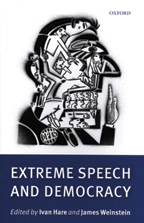Essays on the challenges of protecting free speech in dangerous times.
By Monroe Price

EXTREME SPEECH AND DEMOCRACY
Edited by Ivan Hare and James Weinstein C’75 L’78
Oxford University Press, 2009. $175.
One of the great human-rights questions has been this: how to harmonize a full-bodied commitment to free-speech principles with the harsh recognition that there are circumstances that endanger the body politic, and times when what might be called “extreme speech” can add to that danger. Almost every society that has faced this tension has sought to protect itself, often too expansively. In the late 18th century, the issue found form in the United States, in the Alien and Sedition Act. It has arisen in moments of perceived crisis ever since.
Now Ivan Hare, a British barrister, and James Weinstein, a professor of law at Arizona State University, have combined their energies to organize and collect a group of essays on the subject—essays designed to renew and enrich the debate in a time of widespread public and official preoccupation with various forms of extreme speech, including what is sometimes called extremist Islamist speech. The idea is to canvass how different democracies (primarily focusing on the the U.K. and the U.S.) are dealing with these challenges. This magisterial volume gathers an all-star team of scholars, including philosophy mavens Ronald Dworkin and John Finnis.
In marking modern aspects of “hate speech,” the authors concentrate largely on speech linked to religious belief. But they go far beyond that, and imaginatively so. For example, the book has a rich and robust section about various efforts to preserve, regulate, and protect memory. Some countries have found their efforts to safeguard some degree of social harmony threatened by ideologues who offer competing historic accounts, often outrageous ones. Several chapters provide insight into the structure and application of Holocaust-denial laws, including a broad-ranging chapter by Patrick Weil on the politics of memory, an account of public rituals of commemoration (and attempts to ban them).
A chapter by Ian Cram is filled with details and shadings of the Danish cartoon case. For Cram, what was most worrisome during the days of demonstration and possible violence was the lemming-like tendency for governments to over-react. Examining European cases, Cram contends that the European Court of Human Rights needs to provide a narrower “margin of appreciation” where press barriers are erected, especially in this highly charged environment.
“Without close attention to supervision over national authorities’ restrictions,” he writes, “there will likely be self-censorship on the part of commentators with the result that the violent protests on behalf of those who have been ‘insulted’ will have succeeded in creating a ‘chill’ on freedom of expression that robs the public domain of a range of opinion concerning the links between religious fundamentalism and terrorism.”
Most of the book is anchored in jurisprudence. One fascinating exception is a chapter on “radical religious speech” by Sara Savage and Jose Liht from the University of Cambridge’s Psychology and Religion Research Group at the Centre for Advanced Religious and Theological Studies. The chapter veers from the book’s overall focus on legal analysis to investigate the way certain sorts of narratives gain currency in a society, creating a social context in which outrageous appeals are liable to trump more measured or objective perspectives.
The book has a prophetic side: We seem to be entering a period where societies will become more divided, anguished, and apprehensive, and where the tolerance of “extreme speech” will be limited. Just as an example, the British Parliament has made glorification of terrorism an offence, but what constitutes glorification (much less what constitutes terrorism) remains a problem of inexactitude and an invitation to potential repression. The U.S., while not doing the same thing, renders organizations radioactive as speech providers if they have been labeled a terrorist organization.
Part of the art of this kind of a book is establishing categories that help us think about the problem (in this case the problem of extreme speech—itself a disputable envelope of activity). But each category presents its own imperfections. In this volume, the names given to various kinds of expression include hate speech, incitement to religious hatred, religious speech and expressive conduct that offend secular values (an interesting new category), incitement to, and glorification of, terrorism (a modern category), and Holocaust denial. Merely listing these shows how difficult it is to define “extremist” speech, and to identify the circumstances in which societies cope with its management.
There is a bit of an effort to have a broad spectrum of views represented, but the weight of the argument is advocacy of a free-speech tonic that is virtually absolute. But this tonic masks the dangers and dilemmas that will arise. First, there is the question of when speech is “incitement,” and therefore subject to action. And there’s the question of when speech is not just speech, but part of a criminal act itself (as in the order “ready, aim, fire”); here speech is part of the transaction, not just a set of words wafting in the air.
Another worrying issue is not raised extensively. This is a series of essays about extreme speech and democracy. But just as there’s difficulty defining categories of speech (is it hate speech, blasphemy, Holocaust denial?), there are difficulties in determining the political contexts in which this concept of speech-related rights persists. The U.S. and the U.K. are not only democracies but strong ones. What about nominal democracies that are in shaky shape, or suffer a fragility of governance? And what about states that have different ideologies about power? This book largely avoids these questions by taking the democracy part as a pretty given package. Weinstein frames the general question this way: “[A]t what point, if any, does political and social criticism become so extreme and offensive to basic societal norms or so disruptive of critical social goals that it can legitimately be suppressed in a democratic society?”
One of the most graceful essays is by the late C. Edwin Baker, who was, at the time of his death in 2009, the Nicholas F. Gallicchio Professor of Law and Professor of Communication at Penn. Baker was one of the nation’s most gifted guides to thinking about speech and society. A consistent champion of individual autonomy and dignity, Baker here shows how commitments to the sanctity of the person can serve to tame the perils of hate-speech regulation. Both principled and practical, he sought to show how banning hate speech is often counterproductive. It is frequently ineffective (failing to reduce such speech) or, worse, actively contributes to an enraged, paranoid culture that more intensely and secretly cultivates adherents. Enforcement of hate speech laws, Baker warned, diverts energies from more meaningful political responses to underlying causes. Permitting harsh speech can be important, he elegantly argues, because it moves the society from “the plane of violence to the plane of politics.”
Monroe Price is director of the Center for Global Communication Studies at the Annenberg School for Communication.




